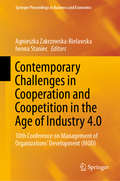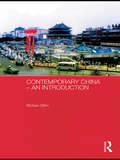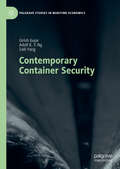- Table View
- List View
Contemporary Business (Fifteenth Edition)
by David L. KurtzBoone and Kurtz, "Contemporary Business 15th Edition" delivers solutions at the speed of business. Solutions designed to help you improve critical thinking--from the Boone and Kurtz Student Case Videos to the Weekly Updates news blog--will get students thinking, talking, connecting and making decisions--at the speed of business. Experience a textbook program that supports your goals to stimulate curiously, show relevance, promote creativity and prepare students for what's ahead, in their academic and business careers.
Contemporary Business 2003
by David L. Kurtz Louis E. BooneIn fact, its contributions to the business curriculum at colleges and universities around the globe were recognized by the Text and Academic Authors Association.
Contemporary Business Law
by Henry R. CheesemanPrimarily a text for courses in Business Law, Contemporary Business Law can also serve as a handy resource/reference for newcomers to the world of business. #65533; Take students beyond rote memorization and into true understanding of the concepts and their implications. #65533; This motivating, up-to-date text presents business law, ethics, and the legal environment in a way that intrigues students, spurs them to ask questions, and takes them beyond rote memorization as they learn the issues and concepts. With its emphasis on covering online law and e-commerce as key parts of the legal environment--as well as today's social, ethical, and international issues that are important to the study of business law--it's the ideal text for your one- or two-semester undergraduate course in Business Law. #65533; This text provides a better teaching and learning experience--for you and your students. Here's how: Tailor the material to your specific course with the Custom Database option. Draw students into the material with a rich selection of cases. Address issues critical to the field of business law today.
Contemporary Business Mathematics for Colleges
by James DeitzPresenting a basic, arithmetic-based approach, CONTEMPORARY BUSINESS MATHEMATICS FOR COLLEGES, 17E uses step-by-step development of concepts, hands-on practice exercises, and real-world applications to effectively prepare students for careers in business. Practical skill-building activities are emphasized throughout as the book progresses, from the most basic to more complex business math topics. Numerous problems and examples are taken from actual businesses. In addition, self-check features such as end-of-section Concept Checks, end-of-chapter Bottom Lines, and end-of-chapter Review Problems enable students to test their understanding before advancing to other topics or assignments.
Contemporary Business Research in the Islamic World: Proceedings of the 14th Global Islamic Marketing Conference, September 2023 (Springer Proceedings in Business and Economics)
by John Fraedrich Hasan Terzi Mehmet Bayirli Marina Pirtskalava Tornike Khoshtaria Baker Al SerhanThis proceedings volume presents a cutting-edge exploration of Islamic marketing, delving into the details of Muslim consumer behavior and Halal business practices, while offering invaluable strategies for navigating the dynamic world of commerce in Islam-oriented regions. Featuring selected chapters from the 14th Global Islamic Marketing Conference, it provides a comprehensive overview of research and insights into Islamic business practices, focusing on innovative marketing strategies. Readers can expect to find detailed analyses and practical guidance on topics such as the impact of neurotransmitters on Islamic research, the influence of religiosity on Muslim consumers’ adoption of cryptocurrency, and how perceived price, quality, and trust affect purchase intentions for Halal products. The volume also explores whether Halal hotels in Malaysia align with green practices, factors driving customer behavior in online banking, and the digitalization of Halal food supply chains through blockchain. Further chapters investigate customer loyalty in Islamic traditional markets, the factors influencing brand love in Moroccan football, and the impact of sustainability and corporate governance in Bangladeshi microfinance institutions. Discussions include the economic implications of incomes of married women in Islamic contexts and models for the key drivers of Islamic insurance. Readers will also find comparative studies on challenges in online sales contracts within Islamic and Jordanian legal frameworks, and insights into the role of e-trust in the success of virtual organizations through knowledge sharing. The volume addresses contemporary issues such as consumer empowerment and privacy, the challenges and opportunities for Islamic microfinance during COVID-19, and self-regulating social media behaviors among Muslim consumers. It also explores the integration of AI-driven chatbots in Halal marketing communication and the concept of faith-centric consumerism, offering a research agenda for Halal brand attitudes. This proceedings volume is an invaluable resource for academics and researchers seeking to deepen their understanding of these specialized topics and for business consultants looking for effective strategies to engage with markets in Islam-oriented regions. It provides both a theoretical framework and practical insights, making it a vital reference for anyone interested in the rapidly evolving fields of Islamic business, marketing, and economics.
Contemporary Business, 16th Edition
by David L. Kurtz Louis E. BooneThis text is an unbound, three hole punched version. Boone and Kurtz, Contemporary Business 16th Edition, delivers solutions at the speed of business to stimulate curiosity, show relevance, promote creativity and prepare students for what's ahead, in their academic and business careers. With thoroughly revised cases, fresh, current examples, and an updated video series, the 16th Edition provides insights into the many facets of business that contribute to the dynamic, ever changing world of work.
Contemporary Capitalism and Civil Society: The Japanese Experience (Evolutionary Economics and Social Complexity Science #14)
by Toshio YamadaThis book is devoted to analyzing contemporary capitalism both in Japan and in the world economy by using the theoretical framework of the French régulation theory and by revisiting the theory of civil society in postwar Japan. The Japanese theory of civil society proposed unique thinking about “freedom and equality” and “human rights” in the postwar era but could not help to come up with effective concepts for an economic analysis of that capitalism of the period. On the other hand, the régulation theory born in the 1970s is well known by its definition of postwar capitalism as Fordism, based on the elaboration of a new conceptual framework, but it soon proved unable to directly explain Japan’s experience by that central concept of Fordism. Inspired by consideration of Japanese civil society and also by the regulationist framework, the author has forged new analytical concepts such as “companyism” to understand Japanese capitalism including the recent “lost decades”, and he elaborates more carefully the concepts of “growth regime” and “institutional change” to grasp the dynamics of the world economy including today’s neoliberal trend. The original benefits of the book consist in 1) reviving a Japanese theory of civil society in the postwar period, 2) applying the régulation theory to the analysis of contemporary Japan, and 3) offering theoretical reflections on the conception of the world economy. Consequently, the author pays special attention to the relationship between the political and the economic as well as regulationist tools and the theory of civil society’s perspective. The principal message of the book is that capitalism or the market economy must be supported by a sound civil society.
Contemporary Capitalism, Crisis, and the Politics of Fiction: Literature Beyond Fordism (Routledge Studies in Contemporary Literature)
by Roberto del Valle AlcaláContemporary Capitalism, Crisis, and the Politics of Fiction: Literature Beyond Fordism proposes a fresh approach to contemporary fictional engagements with the idea of crisis in capitalism and its various social and economic manifestations. The book investigates how late-twentieth and twenty-first-century Anglophone fiction has imagined, interpreted, and in most cases resisted, the collapse of the socio-economic structures built after the Second World War and their replacement with a presumably immaterial order of finance-led economic development. Through a series of detailed readings of the words of authors Martin Amis, Hari Kunzru, Don DeLillo, Zia Haider Rahman, John Lanchester, Paul Murray and Zadie Smith among others, this study sheds light on the embattled and decidedly unstable nature of contemporary capitalism.
Contemporary Case Studies in Health Communication: Theoretical and Applied Approaches
by Maria BrannContemporary Case Studies in Health Communication: Theoretical & Applied Approaches utilizes 28 cases on diverse topics in health communication to develop the reader’s critical thinking skills – thus helping them become more informed health care advocates. By focusing on a variety of topics and utilizing various methodological and theoretical approaches, readers are exposed to real world health complexities and challenged to consider multiple perspectives and resolutions to the cases. To promote classroom discussion and debate, each author’s case conclusion has been omitted. By doing this, the reader is less likely to focus exclusively on only one resolution to the case or a “right” or “wrong” response.
Contemporary Case Studies on Fashion Production, Marketing and Operations (Springer Series in Fashion Business)
by Pui-Sze Chow Chun Hung Chiu Amy C. Y. Yip Ailie K. Y. TangThis book adopts a case study based research approach to examine the contemporary issues in the fashion industry. It documents real-world practices in fashion business from production, marketing to operations. Founded on an extensive review of literature, these case studies discuss the challenges that are pertinent to the current business environment in this important industry, provide benchmarks and generate insights to practitioners as well as suggest future directions to researchers. The book serves as a nexus of the theories and the industrial practices that advances knowledge for both the academia and the private sector in fashion business.
Contemporary Cases in Management: Perspectives from Emerging Markets
by Ashish Gupta Shalini AggarwalEmerging markets due to their dynamism, resilience and complexities are a significant area of study for management theorists and practitioners. This volume brings together case studies from diverse corners of the industry and offers insightful analyses of real-world management challenges and strategies in dynamic environments.The book showcases the diversity of emerging markets that offer unique challenges in finance, marketing, organization and HR, among others. From family-owned enterprises in India grappling with succession-planning to tech startups navigating regulatory uncertainties – these case studies capture the essence of managerial dilemmas in emerging markets. Through rich narratives and rigorous analysis, the essays in this volume provide strategies for organizations to deal with turbulent times, declining sales and productivity, shrinking investments or consumer base and the need for businesses to innovate, expand and grow. The volume also includes reflections from multiple stakeholders, which not only enriches the learning experience but also fosters a deeper understanding of the complex interplay between management practices and broader socio-economic contexts.This book will be of interest to both students and researchers of business studies, management studies, marketing, finance and human resources. It will also be a useful resource for professionals working in government agencies and research agencies and for managers in different industries.
Contemporary Challenges In Risk Management
by Torben Juul AndersenThis book focuses on two central aspects of the risk managing process, namely 1. how managers (can and do) assess developments in the external risk environment and deal with them, and 2. analysing the effects of risk management and different managerial approaches. The articles represent state of the art academic analyses and research contributions.
Contemporary Challenges for Caribbean Economies: Crucial Problems and Practical Solutions
by Terence M. Yhip Brian AlaghebandThe COVID-19 pandemic laid bare economic weaknesses throughout the Caribbean region, and humane standards of living are at risk. This book highlights the retooling that must be done to promote economic stability in this important area of the world. It contributes to ongoing discourse regarding Caribbean economies and highlights the long-term economic challenges that must be addressed to move forward. In this book, economists Terence M. Yhip and Brian Alagheband offer ideas and proposals to reinvigorate economic growth through the adoption of technology and investment in human capital. The book explains how to diversify economies by increasing the complexity of exports. With a shift in priorities, nations will need to raise total factor productivity and potential output. The book offers strategies to diversify the production and export of complex goods and services. The authors note that the necessary capabilities can take nations decades to build. Such investment will require trade-offs and sacrifice. Progress cannot and will not be immediate, but such modifications will produce meaningful economic returns. Contemporary Challenges for Caribbean Economies includes a chapter on the oil future for Guyana, a rising economic “superstar” due to the nation’s oil riches that portend either blessing or curse. It also includes a chapter written by Tawfik Ramtoolah about the impressive dynamism of the Mauritius economy, which transformed from sugar-cane monoculture to industrial and financial services diversification.
Contemporary Challenges in Cooperation and Coopetition in the Age of Industry 4.0: 10th Conference on Management of Organizations’ Development (MOD) (Springer Proceedings in Business and Economics)
by Agnieszka Zakrzewska-Bielawska Iwona StaniecThis proceedings volume provides a fresh perspective on current challenges in cooperation and coopetition in the age of Industry 4.0. Featuring selected papers from the 10th Conference on Management of Organizations’ Development (MOD) held in Zamek Gniew, Poland, this volume extends the knowledge of cooperation and coopetition, presents analytic tools used in the research, considers the potential impact of Industry 4.0 on collaboration, and provides recommendations for managerial practice. Interorganizational relations have been a relevant topic in the management sciences in recent years. Globalization, social, cultural, and technological progress are among the factors shaping the environment for collaboration, determining the conditions for development and defining a set of new challenges that managers have to face in today's knowledge-based economy. This book, therefore, explores emerging problems of organizational development in the light of the needs and challenges of Industry 4.0. Combining the latest theory and practice, the volume provides a realistic outlook on the network economy and interdependencies both within and between sectors.
Contemporary China - An Introduction
by Michael DillonThis book presents a concise introduction to contemporary China. It is intended as a first book for those coming new to the subject, providing the essential information that most people need to know, without going into excessive detail. Its coverage includes the economy, society, politics and international relations; China's history, especially the twentieth century; and Taiwan and Hong Kong as well as the People's Republic of China. The book provides an up-to-date and clear guide to the often bewildering changes which have taken place in China in the late twentieth and early twenty-first centuries. It draws on the enormous body of empirical and theoretical research that is being carried out by economists, political scientists and sociologists on contemporary China, but is itself written in non-technical and accessible language. It does not assume any previous knowledge of China and explanations of Chinese terms are provided throughout the book. It includes a map, a chronology, a glossary of Chinese terms, biographical notes on key figures, and a guide to further reading.
Contemporary Chinese Diasporas
by Min ZhouThis book focuses on International migration among the Chinese long before European colonists set foot on the Asian continent. Long before European colonists set foot on the Asian continent, the Chinese moved across sea and land, seasonally or permanently, to other parts of Asia and the rest of the world to pursue economic opportunities and alternative means of livelihood. This volume addresses the new Chinese diasporas around the world, offering a snapshot of the cosmopolitan and shifting nature of Chinese population dynamics from the perspectives of anthropologists, sociologists, and scholars of international studies.
Contemporary Consumer Culture Theory (Routledge Studies in Marketing)
by John F. Sherry Eileen M. FischerContemporary Consumer Culture Theory contains original research essays written by the premier thought leaders of the discipline from around the world that reflect the maturation of the field Customer Culture Theory over the last decade. The volume seeks to help break down the silos that have arisen in disciplines seeking to understand consumer culture, and speed both the diffusion of ideas and possibility of collaboration across frontiers. Contemporary Consumer Culture Theory begins with a re-evaluation of some of the fundamental notions of consumer behaviour, such as self and other, branding and pricing, and individual vs. communal agency then continuing with a reconsideration of role configurations as they affect consumption, examining in particular the ramifications of familial, gender, ethnic and national aspects of consumers’ lived experiences. The book move on to a reappraisal of the state of the field, examining the rhetoric of inquiry, the reflexive history and critique of the discipline, the prospect of redirecting the effort of inquiry to practical and humanitarian ends, the neglected wellsprings of our intellectual heritage, and the ideological underpinnings of the evolving construction of the concept of the brand. Contemporary Consumer Culture Theory is a reflective assessment, in theoretical, empirical and evocative keys, of the state of the field of consumer culture theory and an indication of the scholarly directions in which the discipline is evolving providing reflection upon a rapidly expanding discipline and altered consumption-scapes by some of its prime movers.
Contemporary Consumption Rituals: A Research Anthology (Marketing and Consumer Psychology Series)
by Cele C. Otnes Tina M. LowreyBringing together scholars in consumer behavior, history, anthropology, religious studies, sociology, and communication, this is the first interdisciplinary anthology spanning the topic of ritual studies. It offers a multifaceted exploration of new rituals, such as Celebrating Kwanzaa, and of the ways entrenched rituals, such as Mardi Gras, gift giving, and weddings have changed. Moreover, it examines the influence of both cultures and subcultures, and will enhance our understanding of why and how consumers imbue goods and services with meaning during rituals. In this volume, the first in the Marketing and Consumer Psychology series: a religious studies scholar talks about the media representation of ritual; communication scholars discuss the transformational aspects of rituals surrounding alcohol consumption; a marketing scholar demonstrates the relevance of organizational behavior theory to understanding gift-giving rituals in the workplace; and a historian describes how the marketing of Kwanzaa was so integral to its successful adoption.
Contemporary Consumption, Consumers and Marketing: Cases from Generations Y and Z
by Brendan CanavanContemporary Consumption, Consumers and Marketing: Cases from Generations Y and Z explores current consumer, consumption and marketing cases and issues, posing questions that complement, extend and challenge established marketing theory while keeping in mind megatrends such as climate crisis, economic inequality and digital connectivity. It also considers how such major changes affect consumer societies, cultures and individuals, especially those from Generations Y and Z. Each chapter is built around a theme that encapsulates current theoretical and professional debates around consumption, consumers and marketing. Examples and up-to-date case studies throughout the book explore how brands are adapting to current circumstances across Generations X, Y and Z and investigate the state of marketing at a time of flux. This book is essential reading for undergraduates, postgraduates and practitioners interested in marketing and consumer behaviour.
Contemporary Container Security (Palgrave Studies in Maritime Economics)
by Zaili Yang Girish Gujar Adolf K. NgThis book belongs to the Port Economics and Global Supply Chain Management strand of the Palgrave Studies in Maritime Economics book series, commissioned by Hercules Haralambides.This book addresses the security of the global system of maritime-based trade, with a focus on container security. Existing discussions about maritime security are almost always tactical, myopic, and fragmented. This book strives to overcome such defects by discussing maritime security from its myriad perspectives – how we should think about it, how we could measure it, and how we can better manage/control it. In this way, the authors examine the ways in which maritime stakeholders can and should work together to build a more secure and resilient global system of maritime trade.
Contemporary Corporate Strategy: Global Perspectives (Routledge Studies in International Business and the World Economy)
by John SaeeWith the onset of the third millennium, increasing numbers of corporations around the world have been undergoing cultural and mindset shift paradigms whilst developing corporate strategies that are increasingly attuned to the highly competitive and dynamic business realities arising from globalising national economies around the world. This research book represents an eclectic collection of latest research articles and empirical studies conducted in different parts of the world on corporate strategy, including usually neglected countries of study such as Germany, Turkey, Greece and Spain. This research book contains over twenty research papers examining various aspects of corporate strategy in different national and international settings, this book is intended to equip readers with the latest knowledge to understand the complexities of corporate strategy both at a theoretical and operational levels. Further, the book is specifically written with the needs of the students of strategy both at an undergraduate and postgraduate who may want to gain contemporary knowledge of strategy based on empirical research.
Contemporary Critiques of Political Economy: Mapping Alternative Planetary Futures
by Ananta Kumar GiriThis book analyses contemporary critiques of political economy and highlights the challenges to rethinking contemporary discourses and practices. It carries out a multi-pronged critical and transformative dialogue involving political economy, moral economy, moral sociology, moral anthropology, and spiritual ecology. The authors discuss diverse themes such as the relationship between consciousness and society, the dialogue between Karl Marx and Carl Gustav Jung, a critical sociology of morality and property relations, moral and political economy of the Indigenous peoples and a critique of modern civilization, economic evaluation, as well as alternative traditions of thinking in Marx, Thoreau, Gandhi, J.C. Kumarappa, Rammanohar Lohia, B.R. Ambedkar and Jayaprakash Narain. A unique transdisciplinary text, the book brings together authors and approaches from both the Global North and South. It will be indispensable to students, research scholars and teachers of humanities and social sciences in such fields as economics, sociology, philosophy, cultural studies and development studies.
Contemporary Developments in Entrepreneurial Finance: An Academic and Policy Lens on the Status-Quo, Challenges and Trends (FGF Studies in Small Business and Entrepreneurship)
by Alexandra Moritz Joern H. Block Stephan Golla Arndt WernerMore extensive regulations, new technologies, and new means of communication have significantly changed the financing landscape for startups and small to medium-sized companies (SMEs). This volume provides a contemporary research-based overview of the latest trends in entrepreneurial finance and outlines expected future developments. Starting with the status quo in market regulations and the financing structure of SMEs, it addresses a broad range of new financing alternatives for innovative startups (e.g. business angel financing, venture capital and corporate venture capital), as well as recent social phenomena (e.g. crowdfunding and initial coin offerings (ICOs)). Incorporating qualitative, quantitative and mixed analytical methods, the book contributes to a better understanding of the financing world by reflecting both the researcher’s and the practitioner’s perspective.
Contemporary Developments in Green Human Resource Management Research: Towards Sustainability in Action? (Routledge Research in Sustainability and Business)
by Douglas W.S. RenwickThis book examines a new topic in Human Resource Management (HRM), green – or environmental – HRM, analysing the role humans play in environmental management at work and environmental behaviours at workplaces around the world. The book begins with a focus on negative workplace green behaviours (e.g. toxic chemical leaks, air pollution, contaminated waste etc.), and what such environmental problems mean for workers, managers and society as a whole. This book outlines relevant, underpinning academic theory and research literature on how HRM is ‘going green’, and details real-life organisational examples derived from original and secondary empirical research to illuminate the implications of adopting Green HRM practices for relevant stakeholders. In doing so, the book offers a new, academic contribution to both the HRM and environmental management literatures.
Contemporary Direct and Interactive Marketing
by Martin Baier Lisa D. SpillerDecades ago, direct marketers gathered customer names and addresses, and created mailing lists; today, much has changed and much has remained the same. This third edition recognizes the growth of various digital marketing formats for conducting direct and interactive marketing today. Today's consumers desire the speed and the control that the new digital and social media formats provide. Direct marketing has always been accountable and measurable, and now with the various digital media formats and computer technology, it is more interactive and precise than ever before. This edition builds on the traditional foundations of direct marketing, and extends into the future where continuous digital innovations are transforming the marketing landscape. We cannot begin to envision what changes are ahead. But one thing is certain: traditional direct and interactive marketing principles will still apply. This edition builds on these traditional foundations, captures the new media and methods, and explores the future innovations of direct and interactive marketing.
























